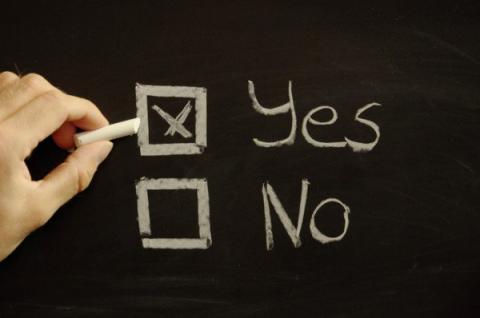With early balloting beginning on 11 October, a new independent poll finds the Arizona Top 2, Open Primary initiative likely to pass. No recent, independent polling data has been available apart from those supporting or opposing the initiative that would create a non-partisan top-two open primary.
The survey of 1,065 Arizona residents found 45% are inclined to vote for the open primary initiative and 31% against it, with 9% undecided and 15% not planning to vote. Looking only at likely voters, this gives the measure a 16 point advantage with 10% undecided.
On November 6th, Arizona voters will be deciding whether to change their election system. Under the current semi-closed primary system, partisan voters select Party candidates for the general election ballot. Since 2000, independents are permitted to vote in a party primary if, and only if, the parties allow them and only for one party. Open Elections – Open Government advocates for Proposition 121. Prop 121 would institute a Constitutional amendment, fundamentally changing the primary process in Arizona. All voters would vote on a single slate of candidates and the top two vote-getters would advance to the general election.
The proposed Arizona system is similar to the top two primary system adopted in Washington State and California and in use in Nebraska legislative elections since 1934. Local Arizona advocates for top-two are quick to point out that this is actually a 100 year old local system used to elect all town and municipal councils (save Tucson) and school board members. Proposition 121 merely extends this well-known system to county, legislative, state, and federal elections. Presidential primaries are exempted.
The 8Sages survey conducted for 10 consecutive days ending 25 September by Dr. Leo J. Shapiro is available on www.8sages.com. Shapiro, a recovering political consultant and sophisticated survey methodologist, is recognized for carefully constructed probes designed to minimize the common flaws of polling. Proposition 121 poses a serious challenge to pollsters, as the questions must be carefully crafted to avoid bias. Advocate polls have been hesitant to release their questions and sampling methods and independent polling by the Morrison Institute is now aged.
Unlike highly biased “push polls,” this survey was designed to asked each respondent was asked to explain in their own words the reason for their vote. Specifically, the survey questions were:
In the upcoming November election, Arizona voters will be asked if they favor or oppose a different way of conducting primary elections, called an “open primary election.” In an open primary, all voters participate in the same primary, and candidates from all parties are on the same ballot. The candidate with the most votes and the candidate with the second most votes in the open primary go onto the general election ballot, even if they are from the same party.What might be good about an open primary?And what might not be good about an open primary?All things considered, are you incline to vote for or against open primary elections?
Voter responses to the last question, "what is the reason you would vote (FOR/AGAINST) open primary elections," indicates most voters believe it gives them more choice in selecting a candidate.
Dr. Shapiro survey found that those favoring the top-two open primary explained: less party affiliations (17.0%); more choice for voters (10.7%); more people could/would vote (9.6%); only the best candidates would make the ballot (4.5%) equal opportunity for candidates (4.5%) and a number of lesser mentioned reasons.
Arizonans opposing Proposition 121 explained their votes as being concerned that only one party might be represented (13.5%); confusing/people won’t know/may vote for the wrong party (7.9%); limits voter choice (5.1%); sabotages opposite parties (3.9%) and a variety of other less frequently explanations.
